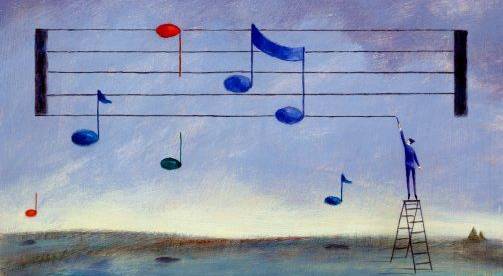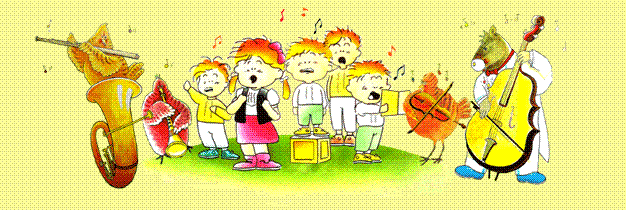




Frequently Asked Questions
1. Aren't private lessons better than group lessons?
Typically, private lessons for beginners are Conservatory based programs and concentrate on working through the primers and learning to read notation. Technique and repertoire are the main ingredients. Examinations quickly become the main focus of the lessons. 89% of the teachers surveyed entered students for exams as quickly as possible and their lessons consequently became centered on scales, theory, studies, exam pieces and bits of sight reading (Gibb, 1993).
Emphasis on technical work and notation during instrumental lessons inhibits the growth of a student's musicianship and creativity. In terms of brain usage, technical skills and note reading are based largely in the left hemisphere. Students who are taught this way never learn to listen properly to themselves and are unable to play with feeling. Once these students learn to rely on notation for their music, it becomes increasingly difficult to explore musical avenues that do not have a notational basis. (Evans, 1985, Priest, 1989.) Most teachers surveyed rated the following components as low priority: only 63% covered playing-by-ear; only 54% included improvisation; only 49% taught composition. (Odam, 1195, Gibbs, 1993, Thompson, 1984 and Jorgenson, 1986)
Before 1850 pianists routinely learned not only to interpret but also to improvise and compose on the piano. After this date piano performance was gradually transformed into a reproductive art. The accomplishments of all round musicians were lost as interpretation and technical prowess took priority. (Gellrich and Parncutt, 1998)
The dominance of notation in verbally oriented and teacher-led lessons leads to hours of fruitless practicing where the body is fully occupied but the brain is not engaged at all. Traditional tutor books encourage students to listen "a note at a time"; their physical movements and coordination are shaped for life by that kind of listening. Most traditional instrument lessons are teacher-centered rather than student-centered. Telling children to do their best to please their teacher causes nervousness and anxiety which leads to muscular and emotional tension. The focus on technique has also been shown to be responsible for unnecessary physical tension leading to injuries. Tension also results when children have no clear mental perception of the music in and of itself. (Chappell, 2001)
2. How are Harmony Road Music Courses different?
This research based program is based on the belief that every child is naturally musical. Harmony Road students learn to play piano, compose and improvise. They have their own books, CD's and midi disks to reinforce their studies at home each week. Harmony Road offers more than just "piano lessons", since it provides a holistic approach to music learning including keyboard playing, music theory, ear training, creative movement, singing, rhythm ensemble, music vocabulary, note reading, composing and improvising all in a creative and nurturing atmosphere. The founder, Jan Keyser, has taken a layered, age-specific approach to programming, developed over many years with Yamaha as a teaching specialist. In 1980 she created and began teaching the Harmony Road program in Portland, Oregon where 600 students enjoy her musical guidance today. Currently there are 120 Harmony Road locations in the United States as well as Britain, New Zealand, Holland, Canada, and Taiwan. The program boasts 98% retention over four years in nearly all locations. Lessons are based on the time tested Harmony Road triangle—parent/caregiver, child and trained Harmony Road teacher.
The incredible musicianship and technical skill that results from this combination results in young musicians who are truly gifted repertory performers and creative composers. Harmony Road is rooted in the old European teaching models, which produced Mozart, Beethoven and Bach. Remember the great composers did not play the classics, they wrote them!
3. How can the Harmony Road program help to develop the young student's brain?
In order to allow pianists to be more creative, imaginative and musical young beginners at Harmony Road are given the opportunity to enhance the neurophysiology of their brains using a whole brain approach to learning. Harmony Road helps students develop a greater understanding of music; obtain a greater sense of physical ease and depth of expression while playing; increase enjoyment and motivational levels; experience less anxiety and physical tension while performing; and demonstrate improved sight reading ability effectively through the use of solfege singing.
When whole brain teaching and listening skills are at the center of a music program, students experience greater unification between the brain, the body and their emotions. The right hemisphere of the brain is able to develop more intuitive and special skills in partnership with the more logical and analytical left hemisphere. This allows students to develop a deep, unconscious well of musical experience from which they can draw, thereby increasing their sensitivity and understanding of music in general.
When children are shown how and encouraged to internalize music from the first lesson, they will be less prone to physical problems due to muscular tensions in their arms and legs. By taking a pupil-centered approach, students have more partnership with the teacher and are more involved in making decisions. Their enjoyment levels rise and their fears of external censure are diminished. Many a promising careers in music has been ended due to stress and physical injury from tension beginning in the early years.
Early childhood music lessons actually enlarge the brain areas used to analyze pitch by 25%. The younger the music training begins, the larger the area. It is postulated that children are born with perfect pitch but are unable to discern it if these areas are not continuously stimulated and neurological connections formed. It is a use it or lose it situation. (Nature, 1998)
College bound seniors who had taken music lessons at some point in their lives scored 52 points higher on the verbal portion of their SAT's and 37 points higher in math than those without: a total of 88 points higher than the national average. Subsequently a study of 7500 music majors showed they had the highest levels of reading scores of any students on campus including those in Math, English, Chemistry and Biology. (Profiles of SAT and Achievement Test Takers, the College Board, 1998)
The University of California at Irvine found that after six months of pre-school piano lessons, students performed 34% better on spacio-temporal testing that those who received no training and those who had played computer games. After learning eighth, quarter, half and whole notes, second and third graders scored 100% higher than their peers who were taught fractions by traditional methods. (Neurological Research, Feb. 1997)
4. Why do you use solfege (do, re, mi, fa...) in your curriculum?
The physical act of singing and saying the solfege syllables is a right-brain activity. Reading is a left brain activity. Children learn the alphabet as it relates to their written language and are often confused relating it to the language of music. The solfege syllables become their musical language.
Also, the letter B,C,D,E and G all end in a long E sound and therefore rhyme, making it difficult to distinguish them. Singing a sequence of letter names is very awkward, while singing a sequence of solfege syllables is very melodic and flows smoothly.
5. How old should a child be to begin music lessons?
The peak age for the development of the brain is around three years. Our programs begin at 18 months but students can begin at any age up to 12 years. Our graduated age specific programs allow each child to move at his or her own pace while being supported by parents and the group itself.
6. Do I need to buy a piano to start Harmony Road Music Lessons?
A piano is primarily a percussion instrument. An electronic keyboard can be purchased for teaching the very young. As the child learns to understand the geography of the keyboard and develops a sense of musicianship and timing, a digital piano with hammer action and pedals or an acoustic piano can be purchased. Your Harmony Road teachers can help you make this decision and direct you to appropriate suppliers. There are some very good rent-to-own programs available to qualified purchasers as well. Keyboards should have at least 60 full-sized keys.
7. Do I need to buy a piano or can I use a keyboard?
You can begin to learn using a keyboard. However long-term students usually purchase or rent a piano at some point in their development. Keyboards have a number of advantages for beginning students. Their keys are easier for little fingers to press. Keyboards also boast a variety of instrumental sounds that children typically like. They also have accessories such as headphones that can enable late-night practice without disturbing others. Additionally Keyboards are usually less expensive and unlike pianos, they don't require tuning . Keyboards should have at least 61 full-sized keys. Having said all that, we recommend learning to play on a piano whenever possible. While the electronic instruments are getting better and better. They cannot duplicate the sound and feel of a piano. A well-maintained piano offers a truly intimate expression between player and instrument.
8. Why study piano?
Piano opens up a whole new world of beauty and inner enchantment only known to the performer. Creating and playing music nurtures the mind and soul. Besides the artistic enjoyment, there are many practical benefits related to studying the piano. Through piano study you are not only learning to play a musical instrument, but also expanding your mental capacity, improving coordination and motor skills, increasing self-esteem, gaining an appreciation of the arts, providing a greater emotional outlet and learning greater self discipline.
A recent study shows that children who study piano score higher on their SAT's. Preschoolers with musical intervention show nearly a 50% boost in spatial IQ. Another study of 78 preschoolers found that learning to play the piano enhances the abstract-reasoning skills needed for learning math and science. The children in the study were divided into four group: the first received the piano keyboard lessons; the second group - singing lessons; the third, computer lessons; and the fourth, no training. The children who were taught piano performed 34 percent higher on "thinking" tasks than the children in the other groups. the benefits of playing the piano begin in early development, and last a lifetime.
9. How old should a child be to begin music lessons?
Our programs begin at 18 months but students can begin at any age. Our graduated age specific programs allow each child to move at his or her own pace.
10. How much should I (or my child) practice?
We prefer not to tell my students exactly how much to practice. As with any pursuit, the level of dedication and commitment varies enormously from person to person. Short practices a little each day work best. There will be days when your child will not want to practice. This is normal and does not necessarily mean that they have lost interest in studying music. Discovering what works best in the context of your own lifestyle is best. Try to start and end practices with something fun. Schedule practices for a time during the day that your child is at his/her best, and keep this practice time constant. Please take time to listen to the CDs as they are an integral part of the learning process.
11. How to Choose the Right Class for your Child - Parent Guidelines
If you are having difficulty deciding which class your child should attend, please read
the following guidelines. All of the programs offer musical activities that are
developmentally appropriate for your child.
The following are suggestions for children whose birthdays place them on the borderline
of two different classes…they will either be the oldest or the youngest child in a class.
There is nothing to be gained by pushing a child ahead of the correct developmental
level. If in doubt, please choose the lower level. It is easier for the teacher to move a
child forward than deal with a child who is frustrated and overwhelmed.
- My child is 3 years old. Should he/she be in Toddler Tunes or Music in Me?
Children who are at least 3 years and 3 months usually do fine in Music in Me. Children who
have just turned three and have already been in Toddler Tunes or another early childhood music
program also do well. However, a child who has just turned three and has never been in music
classes could have an equally happy experience with Toddler Tunes. Toddler Tunes explores
music in a joyful and playful way with few requirements of the child. Music in Me is more
concept-based and expects that over the 16-week semester children will acquire certain
competencies with pitch, rhythm and keyboard geography.
- My child is 4½ years old. Is he/she ready for Harmony Road?
This is a very important decision to make because children who are pressed into Harmony
Road too soon may be so frustrated that they want to give up music classes altogether.
The main difference between Harmony Road and More Music in Me (4 to 5 years) is the way the
keyboard portion of the lesson is handled. In More Music in Me, students explore the keyboard
with a pointer finger or a cluster of fingers. Harmony Road children are introduced to the fivefinger
position at the piano. In order for children to be happy in this program, fine motor skills
must have developed to the point that they can touch, tap, or wiggle any single finger at will.
This is a developmental milestone like walking or potty-training that cannot be rushed. Some
children may be six years old before they this stage. It has nothing to do with musicality. Some
signs of fine motor skill development are being able to write their name in fairly small print,
coloring in the lines, and dexterity with buttons, laces or small building materials.
We recommend that children are five years old before they register for Harmony Road.
However, children who are already in Music in Me and More Music in Me may have advanced at
4½ on the recommendation of the teacher. If your child has already been in an early childhood
music program and you think he/she is showing signs of early fine motor skill development,
please ask to make an appointment with a teacher for an assessment.
- My child is 6 years old. Should he/she be in Harmony Road or Young Musician?
The main difference between Harmony Road and Young Musician is the speed at which we
expect children to acquire the ability to plays hands together and the speed at which they will
learn to read music notation. A child who is six and has good coordination and fine motor skills
(e.g. write neatly, ties laces, handles small building materials) and reads well above grade level in
school may be a candidate for Young Musician.
- My child has a learning disability or a developmental delay. Which class is more appropriate?
Children with learning disabilities or development delays often do better in classes one level lower than they would choose for their chronological age.

Melody in Me
Music Studio

